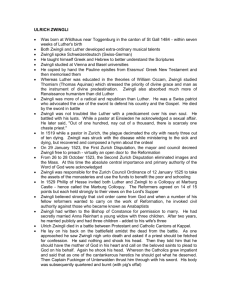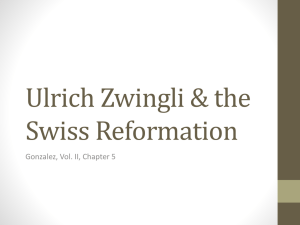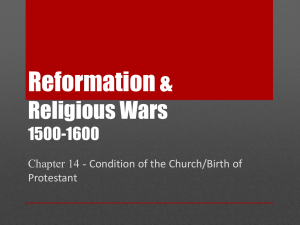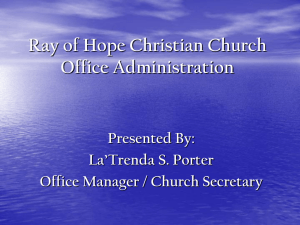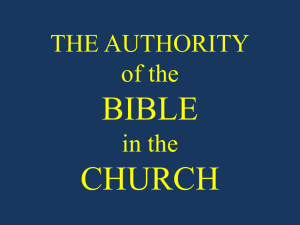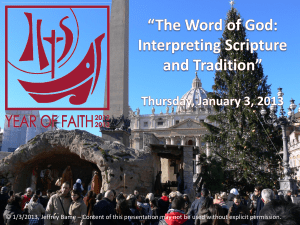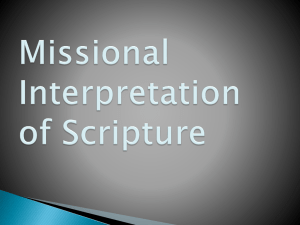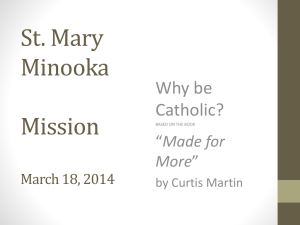The Anabaptist Movement
advertisement
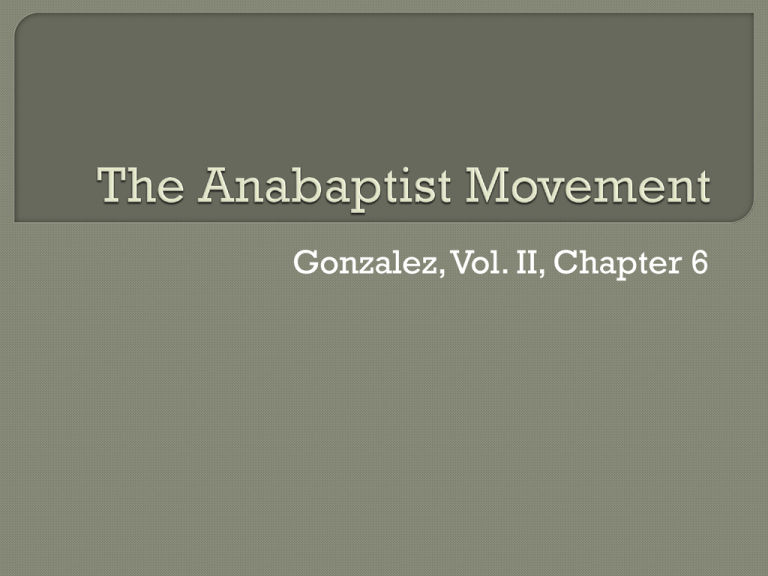
Gonzalez, Vol. II, Chapter 6 LUTHER Sought to cleanse the church from what contradicted Scripture Whatever was not prohibited by Scripture was allowed if it served to edify the people and reinforce the faith ZWINGLI Sought to reconstruct the Church on a scriptural foundation Whatever was not explicitly warranted in Scripture was rejected outright Contended that Zwingli & Luther did not go far enough in their programs of reform A marked contrast between the church and society in the NT Early Christians were persecuted by the state Constantine’s “conversion” was a betrayal of primitive Christianity The Church should not be confused with society One belongs to society by the mere fact of birth; one cannot belong to the church without a personal decision Infant baptism must be rejected, because it assumes that one becomes a Christian simply by being born into a supposedly Christian society The rejection of infant baptism essentially meant the rejection of Christian society True Christians were not to support the state, even against invading infidels (Turks); later this would become fullblown pacifism Supreme New Testament ethic: Sermon on the Mount The “radical reformation” first came to public attention in Zurich, early in Zwingli’s program of reform Certain “brethren” had been urging Zwingli to undertake a more radical program of reform; nearly convinced him to reject infant baptism Breaking ranks with Zwingli, they finally took matters into their own hands Embraced Reformation ideal in 1522; early supporter of Zwingli Disputed with Zwingli over the abolishing the Mass in 1523 After his dispute with Zwingli, Grebel and a group of 15 men began to meet for prayer and private Bible study Final break with Zwingli came in 1525 when Grebel and his companions failed to convince Zwingli on the issue of infant baptism Zwingli argued against Grebel, George Blaurock and Felix Manz on the issue of baptism The city council decided in favor of Zwingli, ordered Grebel’s group to cease their activities, and ordered all unbaptized children to be baptized within eight days, else face exile from the canton Grebel ignored the order to have his own infant daughter baptized Grebel and his companions met together (illegally) in the home of Felix Manz on January 21, 1525 At this meeting, George Blaurock asked Grebel to baptize him on confession of faith; Blaurock then proceeded to baptize the others They committed themselves to living apart from the world according to NT principles Persecution sweeps Europe In the eyes of the state, the Anabaptists were a threat to social order They refused to support the state (militarily) They implied that the structures of power should not be transferred to the church, nor should authority in spiritual matters be transferred to the state Lutheranism depended on the support of the princes who embraced it, who in turn enjoyed great authority in matters both civil and ecclesiastical In Zwingli’s Zurich, the Council of Government had the final word in religious matters In Catholic lands, the state enforced church teaching and practice The Church was a voluntary community, totally distinct from the civil community Radically egalitarian – in most groups, women had the same rights as men; the poor and ignorant were as important as the rich and learned In 1525, the Catholic areas of Switzerland began condemning Anabaptist to death The Zurich Council of Government followed suit in 1526 No uniform policy in Germany; ancient laws against heretics applied to Anabaptists In 1528, Charles V ordered that they be put to death on the basis of ancient Roman laws against Donatists (who also re-baptized) The Diet of Speyer (1529) approved Charles’ imperial decree against the Anabaptists The only German prince to follow his conscience was Philip of Hesse In many areas, Anabaptists were accused of both heresy and sedition (ecclesiastical and criminal charges) Most of the early Anabaptist leaders were scholars (in humanism); most were pacifists Most of the early Anabaptists succumbed to martyrdom The next generation became more radicalized; original pacifism was largely forgotten Muntzer’s ideas of social justice for the peasants had unsettled central Europe (culminating in the Peasant’s Rebellion) Hoffman’s preaching that Day of the Lord was at hand incited the multitudes to believe that Muntzer’s ideas were still within reach Originally a follower of Luther, then of Zwingli Moved to Strasbourg in 1530; rebaptized in April Founded a community in Emden in 1532 Returned to Strasbourg in 1533 after it was prophesied that he would be imprisoned for six months Studied John’s Apocalypse; believed that the New Jerusalem would be established in Strasbourg Rejected pacifism because he believed that the children of God would have to take up arms against the children of darkness His imprisonment “fulfilled” the first half of his prophecy; many flocked to his movement Hoffman predicted that Christ would return in 1533; but Hoffman was still in prison on the day predicted for Christ’s return The movement relocated to the city of Muenster, where the balance of powers between Catholics and Protestants meant that the Anabaptists enjoyed a measure of tolerance Soon Muenster was seen as the “New Jerusalem” Anabaptists took control of the city in 1534, and established a theocracy under John Matthys, a Dutch baker, and his main disciple, John of Leiden Catholics were expelled from the city; the local bishop then gathered an army and besieged the city Died in a foolish sortie against Catholic forces besieging Muenster in April 1534 “King of Jerusalem” Moderate Protestants eventually expelled Sculptures, paintings destroyed; governed by literal interpretation of Scripture Food increasingly scarce Daily claims of visions and revelations Less and less males meant more and more females John of Leiden decreed the practice of polygamy Some of the inhabitants of the city, tired of the excesses of the visionaries, finally opened the gates of the city to the bishop and his besieging army John of Leiden and Knipperdolling were captured, humiliated, tortured and killed Fall of Muenster put an end to revolutionary Anabaptism; impetus for renewed persecution New leaders emphasized pacifism Menno Simons (1496-1561); catholic priest who embraced Anabaptism in 1536 Pacifism was essential part of Christianity No swearing of oaths; nor occupying positions of authority in the state Obedience to the state unless in conflict with the teachings of Scripture Baptism by pouring, only to adults who confess their faith publicly Sacraments are outward signs Practice of footwashing Would not swear oaths or offer military service As a result, they were scattered all over Europe Eventually spread to Russia, North America, and South America
